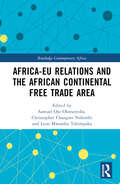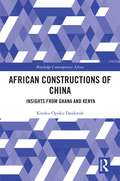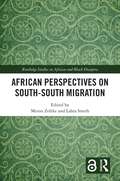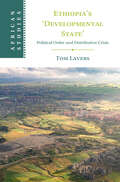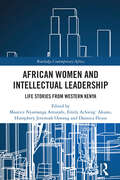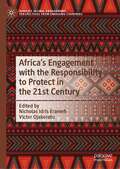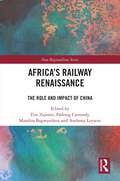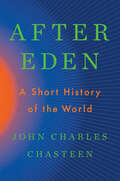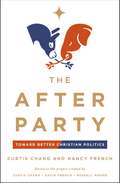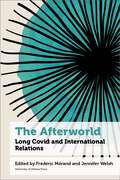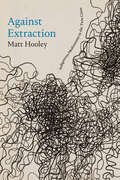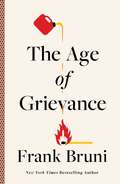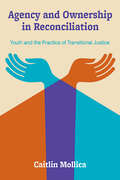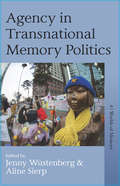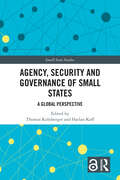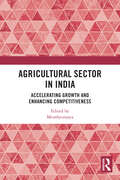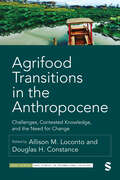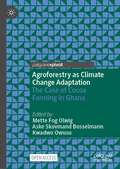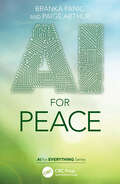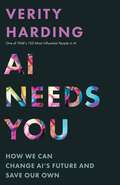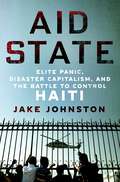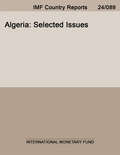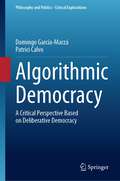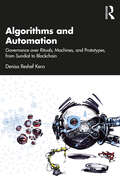- Table View
- List View
Africa-EU Relations and the African Continental Free Trade Area (Routledge Contemporary Africa)
by Samuel Ojo Oloruntoba, Christopher Changwe Nshimbi and Leon Mwamba TshimpakaThis book explores relations between states in the Africa–European Union in view of the African Continental Free Trade Area, both at a regional level and as a series of informal processes of socioeconomic and political interactions between state and non-state actors. The book reconsiders the ways in which actors in the Africa–European Union relationship function, and what that means for regionalism, regionalisation and regional integration. In addition to formalised state-to-state and inter-regional interactions, the book examines the impact of socio-economic and political interactions with non-state actors, including those who engage with regional integration through formal and informal processes such as civil society activists, “African migration evangelists”, human smugglers and human traffickers. The book thus demonstrates that regional and inter-regional engagements include issues that extend beyond the usual discussions of trade. The book is authored from an African perspective and will be of interest to academics who specialise in International Relations, Political Economy, Political Sociology and African Studies. Policy makers and various actors in civil society and think tanks who have an academic inclination and deal with trade, migration and regionalism in Africa and Africa’s relations with Europe will also find the book beneficial.
African Constructions of China: Insights from Ghana and Kenya (Routledge Contemporary Africa)
by Kwaku Opoku DankwahMarking a constructivist turn in Africa-China scholarship, this book explores African constructions of China. Using Ghana and Kenya as case studies, the book outlines the role of diverse state and non-state actors in defining what China represents to the region, and how it compares to Western powers. Resisting Sino- and state-centric analysis of China-Africa relations, this book emphasises the importance of African agency in shaping the discourse. The book demonstrates that the identity construction of a foreign state such as China takes place both at the international level, and at a domestic, intrastate level. Domestic constructions of China in Ghana and Kenya reflect internal tensions about future directions for African political and socio-economic development, and these constructions in turn help to justify government policies towards China. The book concludes by questioning the idea of a straightforward win-win relationship, and suggests that exploitative, hierarchical relations conventionally associated with North-South interactions may continue in South-South relations. This book’s important analysis of the role of domestic non-state actors in shaping African policymaking extends much needed nuance to a sometimes polarised debate. It will be of interest to researchers across the fields of politics, international relations, global development, and African and Chinese Studies.
African Perspectives on South–South Migration (Routledge Studies on African and Black Diaspora)
by Lahra SmithThis book investigates the diverse and dynamic forms of migration within Africa. It will be crucial reading for researchers, students, and policy makers with a focus on South-South Migration, Migration and Inequalities, Migration and Development, and Refugee and Humanitarian Studies.
African Studies Series: Political Order And Distributive Crisis (African Studies #Series Number 168)
by Tom LaversAfrican Women and Intellectual Leadership: Life Stories from Western Kenya (ISSN)
by Maurice Nyamanga Amutabi Emily Achieng’ Akuno Humphrey Jeremiah Ojwang Dannica FleussThis book highlights the pioneering roles of African women as leaders and role models in Kenya, providing examples taken from across education, health, business, and a range of other sectors. Drawing on authentic first-hand accounts and narratives from key women in leadership positions, and those who have lived with them, the book presents the life stories of women leaders over the last fifty years, aiming to preserve their contributions for posterity and to inspire young people with moral, ethical, and progressive role models. The book uses African knowledge production strategies that look at the human being holistically, in the prism of Ubuntu, in order to define leadership in Africa from an African perspective, one that celebrates the role of the mother figure and places women at the centre of African values and societal dynamics. This book will be of interest to researchers and students of African studies, gender studies, and Kenyan education and socio-political history.
Africa's Engagement with the Responsibility to Protect in the 21st Century (Africa's Global Engagement: Perspectives from Emerging Countries)
by Nicholas Idris Erameh Victor OjakorotuThis book sheds light on the practice, challenges, and prospects of the Responsibility to Protect (RtoP) amidst wide contestation, backlash, operational challenges, and expectation gaps associated with the theory and practice of the RtoP. Diverging from existing works, it provides a renewed perspective and alternatives for future deployment of the RtoP and critical insights to the readers on how issues such as support, consolidation, and institutionalization within the broader context of regional dynamics of the RtoP can be best achieved in Africa. The book will be of particular interest to diplomats, international relations experts, scholars, RtoP advocates, the United Nations, and the African Union.
Africa’s Railway Renaissance: The Role and Impact of China (New Regionalisms Series)
by Tim ZajontzThis book investigates the history, political economy and spatiality of Chinese railway projects in Africa. It examines the financial governance of Sino-African railway projects, their socio-cultural, political and economic effects as well as the regional dimension of Africa’s new railway architecture and its function within China’s Belt and Road Initiative. Leading and emerging scholars from Africa, China, Europe and the Americas offer interpretations through politico-economic, historical, geographical and post-colonial conceptual lenses. Case studies on projects in Angola, Ethiopia, Kenya, Nigeria, Tanzania and Zambia offer an empirically rich and cross-disciplinary picture of Sino-African railway developments at the micro-, meso- and macro-levels. Regional analyses on West and East Africa expose persistent obstacles to the regional integration of Africa’s railways. The volume outlines opportunities and challenges related to Africa’s railway renaissance in the post-Covid-19 global political economy and will be of great interest to academics, students and practitioners interested in Africa-China relations and their developmental effects or in the politics of infrastructure, spatial governance and the political economy of transport.
After Eden: A Short History of the World
by John Charles ChasteenTo solve the problems of the twenty-first century, historian John Charles Chasteen argues that we must first know our shared human story. In After Eden, prominent Latin American historian John Charles Chasteen provided a concise history of the world, in which he explores the origins and persistence of the timeless phenomena of humanity’s inhumanity to itself. Where did it come from? Why has it been so prevalent throughout our history? And, most importantly, can we overcome it? Chasteen argues that to do so, we must understand our shared past. While much of that past is violent, we can look for inspiration from major periods when we strived to live more cooperatively, such as our early foraging periods, to the creation of universal religions and ethical systems, the birth of the ideas of individual liberty and freedom, the rise of socialism in response to the massive excesses of global capitalism, the civil rights and decolonization movements of the twentieth century, to the environmental and social justice movements of today. Once we understand who and what we are as a species and a people, we will be in the best position to figure out how to work together to tackle the greatest challenges we face today—mass global inequality and the destruction of our environment. Fully informed by the latest scholarship, After Eden presents a down-to earth, fast-paced narrative of world history, animated by stories of people from all walks of life and enriched by insightful analysis and the author’s extensive world travel.
The After Party: Toward Better Christian Politics
by Curtis Chang Nancy FrenchFor the exhausted, the hurting, and the faithful, The After Party helps reframe our political identity away from the "what" of political positions and toward the "how" being centered on Jesus.This paradigm-shifting book complements The After Party Project--a six-part, video-based, highly interactive curriculum that provides churches, small groups, and individuals with an on-the-ground, biblically based approach to a very complex topic.The After Party: Toward Better Christian Politics helps readers who feel despair about political divisiveness:Engage with others across political differencesLearn specific steps to reframe political identity outside of partisan dividesFocus on how we relate to one another as Jesus teaches before moving to the what of political topicsThe After Party is ideal for:Republicans, Democrats, and Independents looking for renewed hope and humility for our nationLocal leaders seeking to counter animosity toward political opponents, susceptibility to lies, and other practices that threaten the common goodCongregations, classes, and small groups watching The After Party video seriesPastors who want to encourage their congregants to trade their partisan mindsets for the mind of ChristIt's not too late. In today's political environment, faithfulness to a biblical how of political engagement shines as a radical challenge to both the Right and the Left. If you worry about what politics is doing to your community, your family, and your own well-being, The After Party will transform your political imagination.It's time for us to go beyond party politics and--as Christians--believe in the true "party" yet to come.
The Afterworld: Long COVID and International Relations (Health and Society)
by Anthony Amicelle Valérie Amiraux Vincent Arel-Bundock Ari Van Assche Daniel Béland Karim Benyekhlef Mark R. Brawley Dominique Caouette Allison Christians Ryoa Chung François Crépeau Pierre-Marie David Magdalena Dembińska Peter Dietsch Thomas Druetz Pearl Eliadis Philippe Fournier François Furstenberg Pablo Gilabert Timothy Hodges Maya Jegen Juliet Johnson Nicholas King Erick Lachapelle Justin Leroux Pierre Martin Sarah-Myriam Martin-Brûlé María Martín Iniesta Erik Martinez Kuhonta Theodore McLauchlin Frédéric Mégret Cynthia Milton Laurence Monnais Christian Novak Mme Mireille Paquet T. V. Paul Krzysztof Pelc Pierre-Olivier Pineau Vincent Pouliot René Provost Lee Seymour Thomas Soehl Maïka Sondarjee Samuel Tanner Jean-Philippe Thérien Hamish Van Ven Luna Vives Marie-Joëlle Zahar Alain GagnonLa COVID-19 a provoqué la crise mondiale la plus importante et la plus globale du 21e siècle. Pour certains, les répercussions ont été rapides et dramatiques, la pandémie poussant des dizaines de millions de personnes dans la pauvreté et générant une insécurité alimentaire extrême. Pour d’autres, les transformations bouillonnent encore sous la surface et des questions demeurent quant à savoir si les changements de société induits par la COVID-19 perdureront dans la période post-pandémique. Le retour de la géopolitique, avec la guerre en Ukraine et les tensions en Asie, complexifie le portrait mondial.Depuis mars 2020, on a vu une explosion d'analyses à propos de l'impact à court terme et des conséquences futures de la « longue COVID » sur les relations internationales. On a rapidement établi des parallèles établis avec l’effondrement de l'Europe des années 1930, raconté par Stefan Zweig dans ses célèbres mémoires, Le monde d’hier. Alors que la plupart des commentateurs font preuve de pessimisme, certains cherchent des lueurs de changement positif. Cette crise sans précédent exige de réfléchir à la manière dont, dans le « monde d’après », nous pouvons travailler à améliorer l'économie, la justice sociale, l'environnement, les relations entre les sexes, la santé et les institutions politiques - ou, à tout le moins, à faire en sorte qu'elles ne se détériorent pas davantage.Dans ce livre, 50 professeurs des quatre universités montréalaises, parmi les meilleurs experts de leur domaine, braquent le projecteur sur un défi spécifique : celui des relations internationales. À partir de leurs analyses, ils proposent des idées progressistes, pragmatiques et fondées sur les sciences sociales qui pourraient améliorer la coopération internationale, la sécurité et la prospérité durable après la fin de la pandémie.Note : Ce livre est publié en anglais aux Presses de l'Université d'Ottawa. La version originale de l'ouvrage est disponible aux Presses de l'Université de Montréal.
Against Extraction: Indigenous Modernism in the Twin Cities
by Matt HooleyIn Against Extraction Matt Hooley traces a modern tradition of Ojibwe invention in Minneapolis and St. Paul from the mid-nineteenth century to the present as that tradition emerges in response to the cultural legacies of US colonialism. Hooley shows how Indigenous literary and visual art modernisms challenge the strictures of everyday life and question the ecological, political, and cultural fantasies that make multivalent US colonialism seem inevitable. Hooley analyzes literature and art by Louise Erdrich, William Whipple Warren, David Treuer, George Morrison, and Gerald Vizenor in relation to histories of Indigenous dispossession and occupation, enslavement and Black life, and environmental harm and care. He shows that historical narratives of these cities are intimately bound up with the violence of colonial systems of extraction and that concepts like Indigeneity and sovereignty extend beyond treaty-granted promises of political control. These works, created in opposition and proximity to the extraction of cultural, political, and territorial resources, demonstrate how Indigenous claims to life and land matter to rethinking and unmaking the social and ecological devastations of the colonial world.
The Age of Grievance
by Frank BruniFrom bestselling author and longtime New York Times columnist Frank Bruni comes a lucid, powerful examination of the ways in which grievance has come to define our current culture and politics, on both the right and left.The twists and turns of American politics are unpredictable, but the tone is a troubling given. It&’s one of grievance. More and more Americans are convinced that they&’re losing because somebody else is winning. More and more tally their slights, measure their misfortune, and assign particular people responsibility for it. The blame game has become the country&’s most popular sport and victimhood its most fashionable garb. Grievance needn&’t be bad. It has done enormous good. The United States is a nation born of grievance, and across the nearly two hundred and fifty years of our existence as a country, grievance has been the engine of morally urgent change. But what happens when all sorts of grievances—the greater ones, the lesser ones, the authentic, the invented—are jumbled together? When people take their grievances to lengths that they didn&’t before? A violent mob storms the US Capitol, rejecting the results of a presidential election. Conspiracy theories flourish. Fox News knowingly peddles lies in the service of profit. College students chase away speakers, and college administrators dismiss instructors for dissenting from progressive orthodoxy. Benign words are branded hurtful; benign gestures are deemed hostile. And there&’s a potentially devastating erosion of the civility, common ground, and compromise necessary for our democracy to survive. How did we get here? What does it say about us, and where does it leave us? The Age of Grievance examines these critical questions and charts a path forward.
Agency and Ownership in Reconciliation: Youth and the Practice of Transitional Justice
by Caitlin MollicaThe importance of youth's substantive participation for the realization of inclusive reconciliation practices has rarely been acknowledged. Agency and Ownership in Reconciliation provides a comprehensive, nuanced, and empirical account of the contribution of young people's voices to the success of transitional justice and peacebuilding practices. Caitlin Mollica illustrates the role of political will and agency in the development of transitional justice mechanisms that are substantively inclusive of those traditionally marginalized by post-conflict institutions, most notably youth. In doing so, she highlights the importance of youth to lasting peace and meaningful justice. She does so by looking specifically at how truth and reconciliation commissions from South Africa to the Solomon Islands engage with the voices of youth and the meanings youth self-ascribe to their experiences during truth and reconciliation commission processes. In a field which traditionally prioritizes stories about youth, Agency and Ownership in Reconciliation looks to center stories by youth.
Agency in Transnational Memory Politics (Worlds of Memory #4)
by Jenny Wüstenberg and Aline SierpThe dynamics of transnational memory play a central role in modern politics, from postsocialist efforts at transitional justice to the global legacies of colonialism. Yet, the relatively young subfield of transnational memory studies remains underdeveloped and fractured across numerous disciplines, even as nascent, boundary-crossing theories on topics such as multi-vocal, traveling, or entangled remembrance suggest new ways of negotiating difficult political questions. This volume brings together theoretical and practical considerations to provide transnational memory scholars with an interdisciplinary investigation into agency—the “who” and the “how” of cross-border commemoration that motivates activists and fascinates observers.
Agency, Security and Governance of Small States: A Global Perspective (Small State Studies)
by Thomas Kolnberger Harlan KoffAgency, Security and Governance of Small States examines what seems to be a defining paradox of Small-State Studies: the simultaneous coexistence (and possible co-dependence) of vulnerability and opportunity related to small-state size. This book analyses small states within the framework of this apparent paradox. Traditionally, Small-State Studies has focused on three guiding questions: what constitutes a ‘small state’? What explains small-state influence in global affairs? Are small states truly vulnerable to security threats given the expansion of multilateralism and regionalism throughout the world? This book contends that new questions should be asked which recognise the important shifts in twenty-first century security paradigms, to better understand how some states deploy their smallness as a resource for agency in supranational contexts. By varying historical, geographical, security, and governance contexts, the book embraces a most-different-cases approach. The historical perspective is often neglected in Small-State Studies but contributes to understanding how small states have often, over time, transformed perceived insecurity into agency. By focusing on different world regions, the authors enable the comparative analysis of collective actions, and the creation and implementation of institutions for ‘common sense purposes’ within a geographical region. Of particular contemporary importance, the book includes contributions which contend with hard-security issues alongside other soft-security challenges. The comparison of case studies confirms that hard-security vulnerability and soft-security opportunities seem to be two sides of the same coin, which reinforces the book’s focus on small-state paradoxes, and raises the question of whether smallness can be considered the defining characteristic of governance in these countries. This book will have a broad appeal because of the different world regions it analyses. It will be of interest to postgraduate students, scholars, and researchers of international relations, security, sustainability, governance, development, and political economy, as well as Small-State Studies. The Chapters 4, 8 and 11 of this book are freely available as downloadable Open Access PDFs at http://www.taylorfrancis.com under a Creative Commons Attribution-Non Commercial-No Derivatives (CC-BY-NC-ND) 4.0 license. The publication of Chapter 4 as Open Access has been made possible by the Institute of History at the University of Luxembourg. The publication of Chapter 8 as Open Access has been made possible by Western Sydney University. The publication of Chapter 11 as Open Access has been made possible by the University of Hamburg.
Agricultural Sector in India: Accelerating Growth and Enhancing Competitiveness
by MruthyunjayaThis book presents a comprehensive overview of a range of concepts, methods, strategies and policies in agriculture and natural resource management, environmental economics, production economics and sustainable agricultural development. It explores effective analytical tools and science, innovations, and management solutions to enhance yields, manage the supply chain, strengthen institutional mechanisms, and service and support systems for farmers. It highlights the importance of enabling policies which can benefit farmers, resulting in cost-efficient and quality-improving farm practices, increased profits and income for farmers, and better management of natural resources. The essays in the book honour the academic, teaching, and research contributions of Professor R. Ramanna in the field of agricultural economics. They also address issues which are relevant to the growing research in sustainable agricultural development and natural resource management including the use of new concepts, tools, analyses, technologies, innovations, and policy strategies modelled in local contexts that can easily be scaled and applied to similar contexts elsewhere. This book will be of interest and use to students, researchers, practitioners,and policymakers working in varied fields of agricultural economics, sustainable development, public policy, rural sociology, political economy, economics of innovation, institutional economics, and industrial organisation.
Agrifood Transitions in the Anthropocene: Challenges, Contested Knowledge, and the Need for Change (SAGE Studies in International Sociology)
by Allison M. Loconto Douglas H. ConstanceThe greatest challenges of the twenty-first century stem from the fact that we are now living in a new epoch: the Anthropocene. The human footprint on the planet can no longer be denied. One of the greatest and most essential human innovations, agriculture, is being increasingly recognised as a leading contributor to climate change. According to global governance bodies, the world will need to feed a predicted nine billion people by 2050. However, in this Anthropocene, we must address the environmental inequalities in how these people will be fed. This book explores our current societal struggles to transition towards more sustainable agrifood systems. It suggests that debates around sustainable agriculture must be social as well as technical, exploring the growth of social movements campaigning for more democratic food systems. However, as each chapter demonstrates, both the problems and the solutions in sustainable agriculture are highly contested. Using the term ′agrifood′ to capture the nexus between research, governance and the environment knowledge-environment-governance, this book provides an in-depth and wide-ranging account of current research around agricultural production and food consumption. The book introduces the Anthropocene along with the fundamental question that it poses about human-nature interactions. It outlines the core concerns related to agriculture and food and the debates around the need for agrifood system transitions. Each chapter investigates controversies in the field through case studies. These contributions offer a call for sociologists of agriculture and food to engage with the controversies unfolding in the Anthropocene.
Agrifood Transitions in the Anthropocene: Challenges, Contested Knowledge, and the Need for Change (SAGE Studies in International Sociology)
by Allison M. Loconto Douglas H. ConstanceThe greatest challenges of the twenty-first century stem from the fact that we are now living in a new epoch: the Anthropocene. The human footprint on the planet can no longer be denied. One of the greatest and most essential human innovations, agriculture, is being increasingly recognised as a leading contributor to climate change. According to global governance bodies, the world will need to feed a predicted nine billion people by 2050. However, in this Anthropocene, we must address the environmental inequalities in how these people will be fed. This book explores our current societal struggles to transition towards more sustainable agrifood systems. It suggests that debates around sustainable agriculture must be social as well as technical, exploring the growth of social movements campaigning for more democratic food systems. However, as each chapter demonstrates, both the problems and the solutions in sustainable agriculture are highly contested. Using the term ′agrifood′ to capture the nexus between research, governance and the environment knowledge-environment-governance, this book provides an in-depth and wide-ranging account of current research around agricultural production and food consumption. The book introduces the Anthropocene along with the fundamental question that it poses about human-nature interactions. It outlines the core concerns related to agriculture and food and the debates around the need for agrifood system transitions. Each chapter investigates controversies in the field through case studies. These contributions offer a call for sociologists of agriculture and food to engage with the controversies unfolding in the Anthropocene.
Agroforestry as Climate Change Adaptation: The Case of Cocoa Farming in Ghana
by Mette Fog Olwig Aske Skovmand Bosselmann Kwadwo OwusuThis open access book provides multidisciplinary perspectives on the potential of agroforestry to mitigate the negative impacts of climate change on cocoa production. Against the backdrop of increasingly precarious farmer livelihoods, it focuses on cocoa-agroforestry in Ghana – the second largest producer of cocoa in the world. Taking the reader on a journey across experimental plots and on-farm studies, the book delivers a holistic understanding of cocoa-agroforestry. Chapters examine historical yield and climate interactions, the effects of heat and drought on cocoa plants and the role of differing shade trees on soil fertility, yields, pests and diseases. The book discusses the socioeconomics of shade tree management, including cost-benefits, tree rights and competition for natural resources emphasizing policy implications and recommendations.Taking a multidisciplinary approach to climate-agriculture interactions, the book provides an innovative understanding of agroforestry and perennial cropping systems that goes beyond the Ghanaian cocoa belt. It is of relevance to students, researchers, farmers, practitioners and policymakers working with agroforestry and climate change adaptation.This is an open access book.
AI for Peace (AI for Everything)
by Branka Panic Paige ArthurThe role of artificial intelligence in war is widely recognized, but is there also a role for AI in fostering peace and preventing conflict? AI for Peace provides a new perspective on AI as a potential force for good in conflict-affected countries through its uses for early warning, combating hate speech, human rights investigations, and analyzing the effects of climate change on conflict. This book acts as an essential primer for introducing people working on peacebuilding and conflict prevention to the latest advancements in emerging AI technologies and will act as guide for ethical future practice. This book also aims to inspire data scientists to engage in the peacebuilding and prevention fields and to better understand the challenges of applying data science in conflict and fragile settings.
AI Needs You: How We Can Change AI's Future and Save Our Own
by Verity HardingA humanist manifesto for the age of AIArtificial intelligence may be the most transformative technology of our time. As AI&’s power grows, so does the need to figure out what—and who—this technology is really for. AI Needs You argues that it is critical for society to take the lead in answering this urgent question and ensuring that AI fulfills its promise.Verity Harding draws inspiring lessons from the histories of three twentieth-century tech revolutions—the space race, in vitro fertilization, and the internet—to empower each of us to join the conversation about AI and its possible futures. Sharing her perspective as a leading insider in technology and politics, she rejects the dominant narrative, which often likens AI&’s advent to that of the atomic bomb. History points the way to an achievable future in which democratically determined values guide AI to be peaceful in its intent; to embrace limitations; to serve purpose, not profit; and to be firmly rooted in societal trust.AI Needs You gives us hope that we, the people, can imbue AI with a deep intentionality that reflects our best values, ideals, and interests, and that serves the public good. AI will permeate our lives in unforeseeable ways, but it is clear that the shape of AI&’s future—and of our own—cannot be left only to those building it. It is up to us to guide this technology away from our worst fears and toward a future that we can trust and believe in.
Aid State: Elite Panic, Disaster Capitalism, and the Battle to Control Haiti
by Jake JohnstonHaiti’s state is near-collapse: armed groups have overrun the country, many government officials have fled after the 2021 assassination of President Moise and not a single elected leader holds office, refugees desperately set out on boats to reach the US and Latin America, and the economy reels from the after-effects of disasters, both man-made and natural, that destroyed much of Haiti’s infrastructure and institutions. How did a nation founded on liberation—a people that successfully revolted against their colonizers and enslavers—come to such a precipice?In Aid State, Jake Johnston, a researcher and writer at the Center for Economic and Policy Research in Washington, DC, reveals how long-standing US and European capitalist goals ensnared and re-enslaved Haiti under the guise of helping it. To the global West, Haiti has always been a place where labor is cheap, politicians are compliant, and profits are to be made. Over the course of nearly 100 years, the US has sought to control Haiti and its people with occupying police, military, and euphemistically-called peacekeeping forces, as well as hand-picked leaders meant to quell uprisings and protect corporate interests. Earthquakes and hurricanes only further devastated a state already decimated by the aid industrial complex. Based on years of on-the-ground reporting in Haiti and interviews with politicians in the US and Haiti, independent aid contractors, UN officials, and Haitians who struggle for their lives, homes, and families, Aid State is a conscience-searing book of witness.
Algeria: Selected Issues Paper (Imf Staff Country Reports #Country Report No. 14/342)
by International Monetary Fund. Middle East and Central Asia Dept.A report from the International Monetary Fund.
Algorithmic Democracy: A Critical Perspective Based on Deliberative Democracy (Philosophy and Politics - Critical Explorations #29)
by Domingo García-Marzá Patrici CalvoBased on a deliberative democracy, this book uses a hermeneutic-critical methodology to study bibliographical sources and practical issues in order to analyse the possibilities, limits and consequences of the digital transformation of democracy. Drawing on a two-way democracy, the aim of this book is intended as an aid for thinking through viable alternatives to the current state of democracy with regard to its ethical foundations and the moral knowledge implicit in or assumed by the way we perceive and understand democracy. It is intended to stimulate reflection and discussion on the basis that, by addressing what we understand as democracy, we can inevitably influence the reality known as democracy. Democracy’s evident regression in today’s world makes this all too apparent: it has become a hostage to all kinds of autocracies and technopopulisms, which are supported to a greater or lesser extent by the current algorithmic revolution.
Algorithms and Automation: Governance over Rituals, Machines, and Prototypes, from Sundial to Blockchain
by Denisa Reshef KeraTo enact the book’s central theme of automation and human agency, the author designed a Bot trained on her book to support dialogue with the content and facilitate discussions. If you like to compare what the author says and Bot ‘interprets’ or generates, go here https://www.anonette.net/denisaBot/ Algorithms and Automation: Governance over Rituals, Machines, and Prototypes, from Sundial to Blockchain is a critical examination of the history and impact of automation on society. It provides thought-provoking perspectives on the history of automation and its relationship with power, emphasizing the importance of considering the social context in which automation is developed and used. The book argues that automation has always been a political and social force that shapes our lives and futures, rather than a neutral tool. The author provides a genealogy of automation, tracing its development from ancient rituals to modern-day prototypes, and highlights the challenges posed by new technologies such as blockchain and artificial intelligence. The volume argues that we need more democratic and accountable governance over technological innovation to ensure that it respects human rights, political pluralism, legitimacy, and other values we hold dear in our institutions and political processes. An engaging read on a fascinating topic, this book will be indispensable for scholars, students, and researchers of science and technology studies, digital humanities, politics and governance, public policy, social policy, system design and automation, and history and philosophy of science and technology. It will also be of interest to readers interested in the interactions of the sciences and the social sciences and humanities.
